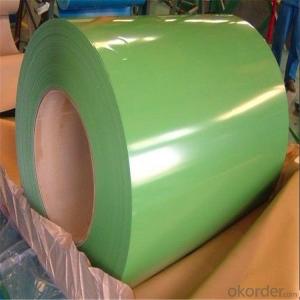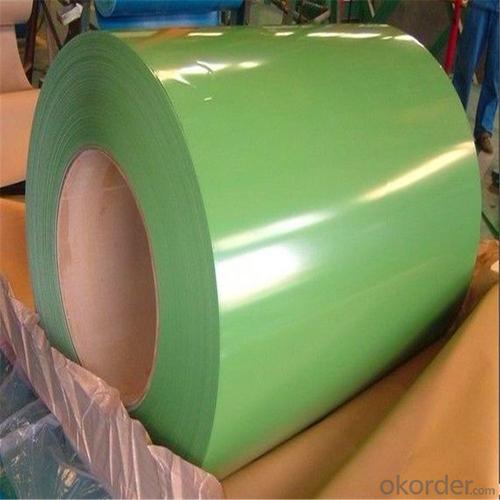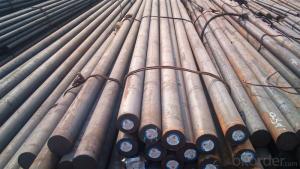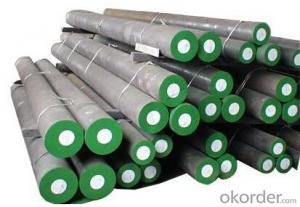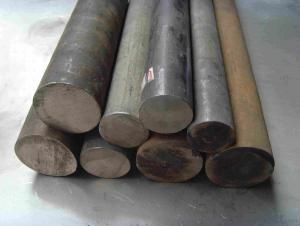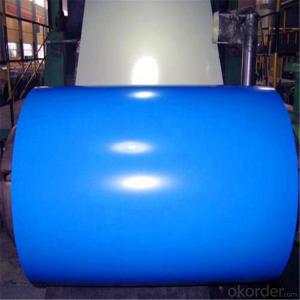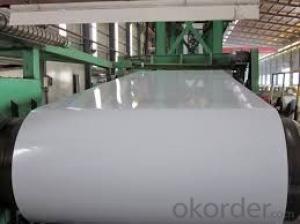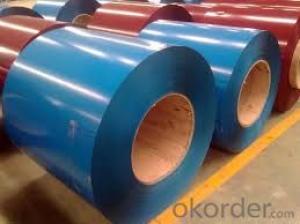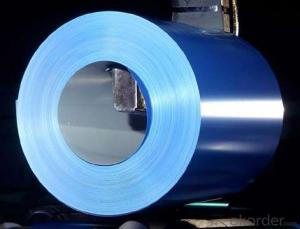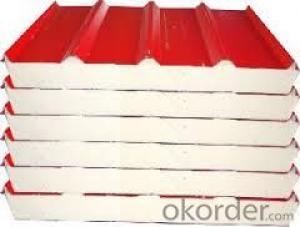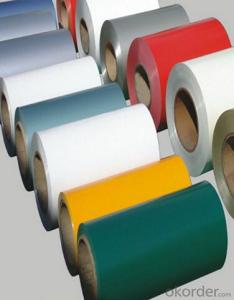Factory Colorful PPGI Prepainted Galvanized Steel Coil
- Loading Port:
- Tianjin
- Payment Terms:
- TT OR LC
- Min Order Qty:
- 100 m.t.
- Supply Capability:
- 500000 m.t./month
OKorder Service Pledge
OKorder Financial Service
You Might Also Like
Specification
Factory Colorful PPGI Prepainted Galvanized Steel Coil
Description of Factory Colorful PPGI Prepainted Galvanized Steel Coil
Product | PPGI/PPGL |
Capacity | 5,000 tons/month |
Base material | Hot dipped galvanized steel |
Thickness | 0.2-2.0mm |
Width | 600-1250mm(according to your need) |
Coil Weight | 3-6tons |
Quality | SGCC, DX51D |
Color | RAL No. or customers samples’ color |
Zinc-coating | 30g/m2-180g/m2 |
Coil ID | 508mm/610mm |
Technique | Cold rolled—hot dipped galvanized—color coated |
Painting | Top painting:15~25μm |
Back painting: 6~10μm | |
Tolerance | Thickness: +/-0.02mm |
Width:+/-2mm | |
Shipment time | within 15-45 workdays |
Payment | T/T, L/C at sight |
Packing | Standard export packing |
The special order can be negotiated. | |
Application of Factory Colorful PPGI Prepainted Galvanized Steel Coil
APPLICATION OF OUR PREPAINTED STEEL | ||||||||||
Construction | Outside | Workshop,agricultural warehouse,residential precast unit | ||||||||
corrugated roof,roller shutter door,rainwater drainage pipe,retailer booth | ||||||||||
Inside | Door,doorcase,light steel roof stucture,folding screen,elevator,stairway,ven gutter,Construction Wall | |||||||||
Electrical applicance | Refrigerator,washer,switch cabnet,instrument cabinet,air conditioning,micro-wave owen,bread maker | |||||||||
Fuiniture | Central heating slice,lampshade,chifforobe,desk,bed,locker,bookself | |||||||||
Carrying trade | Exterior decoration of auto and train,clapboard,container,isolation lairage,isolation board | |||||||||
Qthers | Writing panel,garbagecan,billboard,timekeeper,typewriter,instrument panel,weight sensor,photographic equipment | |||||||||
Products Show of Factory Colorful PPGI Prepainted Galvanized Steel Coil

Product Advantages
1.With nearly 20 years experience in prepainted steel, accommodate different marketdemands. | ||||||||||||||
2.'Quality first, service first' is our business aim; 'The good faith get respect,cast quality market' is our Business philosophy . | ||||||||||||||
3.Having two series producttion line,with the abbual production capacity of 240000 tons. | ||||||||||||||
4.Exceed International ISO9001:2008&ISO14001:2004 quality and environmental standards | ||||||||||||||
5.Meet with ROHS standard |
Company Information
CNBM International Corporation is the most important trading platform of CNBM group.
Whith its advantages, CNBM International are mainly concentrate on Cement, Glass, Iron and Steel, Ceramics industries and devotes herself for supplying high qulity series of refractories as well as technical consultancies and logistics solutions.


F A Q
1, Your advantages?
professional products inquiry, products knowledge train (for agents), smooth goods delivery, excellent customer solution proposale
2, Test & Certificate?
SGS test is available, customer inspection before shipping is welcome, third party inspection is no problem
3, Factory or Trading Company?
CNBM is a trading company but we have so many protocol factories and CNBM works as a trading department of these factories. Also CNBM is the holding company of many factories.
4, Payment Terms?
30% TT as deposit and 70% before delivery.
Irrevocable L/C at sight.
5, Trading Terms?
EXW, FOB, CIF, FFR, CNF
6, After-sale Service?
CNBM provides the services and support you need for every step of our cooperation. We're the business partner you can trust.
For any problem, please kindly contact us at any your convenient time.
We'll reply you in our first priority within 24 hours.
- Q: What are the main factors affecting the wear resistance of special steel?
- There are several main factors that affect the wear resistance of special steel. Firstly, the composition of the steel plays a crucial role. The addition of certain alloying elements, such as chromium, vanadium, and tungsten, can significantly enhance the wear resistance of the steel. These elements form hard carbides or nitrides within the steel matrix, which increase its hardness and resistance to wear. Secondly, the heat treatment process used on the steel greatly influences its wear resistance. Through processes like quenching and tempering, the steel can be hardened to achieve a desired level of wear resistance. The heat treatment also helps in refining the microstructure of the steel, making it more resistant to wear and deformation. Thirdly, the microstructure of the steel is another important factor. The presence of fine grains and a homogeneous distribution of carbides or other reinforcing phases within the steel matrix greatly enhances its wear resistance. Additionally, the presence of retained austenite, a metastable phase, can also contribute to improved wear resistance. Furthermore, the hardness of the steel is a key determinant of its wear resistance. A higher hardness level generally translates to better wear resistance, as it provides resistance against the abrasive forces acting on the steel surface. Lastly, the design and surface finish of components made from special steel also affect their wear resistance. The shape, size, and surface roughness of the components can influence the distribution and magnitude of the contact stresses on the steel, thereby affecting its wear resistance. In conclusion, the wear resistance of special steel is influenced by factors such as its composition, heat treatment, microstructure, hardness, and the design and surface finish of the components. By carefully considering these factors, engineers can optimize the wear resistance of special steel for various applications.
- Q: How is special steel used in the production of consumer goods?
- Special steel is used in the production of consumer goods due to its superior strength, durability, and corrosion resistance. It is commonly used in manufacturing appliances, cutlery, automotive components, and construction materials, ensuring the end-products meet high-quality standards and have a longer lifespan.
- Q: How is special steel heat treated?
- Special steel is heat treated using a combination of heating and cooling processes to improve its strength, hardness, and other desired properties. This typically involves heating the steel to a specific temperature, known as the austenitizing temperature, followed by rapid cooling, known as quenching, to transform the steel's microstructure. This is then followed by tempering, where the steel is reheated to a lower temperature to relieve internal stresses and further enhance its mechanical properties. The specific heat treatment process and parameters vary depending on the type of special steel and the desired final properties.
- Q: How is precipitation-hardening steel used in aerospace applications?
- Precipitation-hardening steel is used in aerospace applications due to its excellent strength-to-weight ratio, corrosion resistance, and high temperature endurance. It is commonly used to manufacture various components like aircraft landing gear, engine parts, and structural elements. The steel's ability to be heat treated and aged to enhance its mechanical properties makes it ideal for aerospace applications, where strength, durability, and lightweight materials are crucial for safe and efficient flight operations.
- Q: How does special steel contribute to reducing product lead times?
- Special steel contributes to reducing product lead times by offering several advantages. Firstly, special steel is known for its high strength and durability, allowing manufacturers to produce parts that can withstand harsh conditions and heavy usage. This ensures that the products made with special steel have a longer lifespan, reducing the need for frequent repairs or replacements. Secondly, special steel can be fabricated into complex shapes and sizes, enabling manufacturers to produce intricate components with high precision. This eliminates the need for additional machining processes, saving time and reducing lead times. Lastly, special steel often has improved mechanical properties, such as higher hardness or heat resistance, which can enhance the performance of the final product. This allows manufacturers to meet specific requirements and deliver high-quality products more efficiently, ultimately reducing lead times.
- Q: What are the different surface protection methods used for special steel?
- To enhance the durability and resistance of special steel, several methods of surface protection are employed. Galvanizing is a commonly utilized technique, wherein a layer of zinc is applied to the steel surface. This shields the steel from corrosion and rusting, thereby prolonging its lifespan and preserving its appearance. Galvanizing can be executed through either hot-dip galvanizing or electroplating, depending on the specific requirements of the steel. Another method is powder coating, which entails the application of a dry powder to the steel surface, followed by curing at high temperatures. This results in the formation of a protective layer that is impervious to chipping, scratching, and fading. Powder coating is often chosen for its aesthetic benefits, as it offers a wide range of color options and can enhance the visual appeal of the steel. Furthermore, various types of paints and coatings can be employed to protect special steel. These coatings can be applied using a spray or brush technique, and they serve as a barrier against corrosion, chemicals, and UV radiation. Depending on the specific needs and environmental conditions, epoxy, polyurethane, and acrylic coatings are frequently utilized. Moreover, stainless steel possesses inherent resistance to corrosion due to its composition. However, to further safeguard it, passivation can be employed. Passivation involves a chemical treatment that eliminates iron particles from the surface, thus preventing corrosion and improving the steel's resilience against staining and pitting. Lastly, a layer of ceramic or enamel coating can be applied to protect special steel. These coatings offer high levels of resistance to heat, chemicals, and physical abrasion. They can be applied through spraying or dipping and are commonly used in environments where the steel will be exposed to extreme conditions or aggressive substances. In conclusion, the various surface protection methods utilized for special steel encompass galvanizing, powder coating, painting, passivation, and ceramic/enamel coating. These methods aim to enhance the steel's durability, corrosion resistance, and overall lifespan, ensuring that it can withstand diverse environmental factors while maintaining its structural integrity.
- Q: How does special steel contribute to the agriculture industry?
- The agriculture industry heavily relies on special steel to ensure durable and high-performance materials for agricultural machinery and equipment. These steels are specifically designed to withstand the harsh conditions and heavy workloads found in farming operations, resulting in increased efficiency and productivity. Special steel plays a crucial role in agriculture, particularly in the manufacturing of tillage equipment like plows, cultivators, and harrows. These implements require robust materials that can withstand the abrasion and impact of soil and rocks. Special steel provides the necessary strength and hardness to effectively break up the soil, improve soil quality, and prepare the land for planting. Moreover, special steel is extensively used in the production of machinery for planting, harvesting, and processing agricultural products. Combine harvesters, for example, heavily rely on special steel components for their cutting systems, threshing mechanisms, and grain handling systems. By utilizing special steel, these machines can efficiently handle the demanding tasks of crop collection, separation, and storage. Furthermore, special steel enhances the longevity and reliability of agricultural equipment. Agricultural machinery operates in challenging environments exposed to corrosive elements, moisture, and extreme temperatures. Special steel, often coated with protective layers, offers resistance against corrosion, rust, and wear, ultimately extending the lifespan of agricultural equipment. Additionally, the use of special steel in machinery manufacturing leads to improved precision and accuracy in agricultural operations. Precision agriculture, which involves using advanced technologies to optimize productivity, reduce waste, and conserve resources, increasingly relies on special steel components. These components enable more precise movements, better control, and increased accuracy in machinery, resulting in improved efficiency and waste reduction. In conclusion, special steel is essential to the agriculture industry as it provides the necessary strength, durability, and precision required for various agricultural machinery and equipment. By utilizing these high-quality materials, farmers can enhance productivity, reduce downtime, and achieve sustainable farming practices.
- Q: Can special steel be used in the electronics manufacturing industry?
- Yes, special steel can be used in the electronics manufacturing industry. Special steel alloys, such as stainless steel or high-strength low-alloy (HSLA) steel, offer excellent properties like corrosion resistance, electrical conductivity, and magnetic shielding, making them suitable for various electronic components like connectors, sensors, circuit boards, and casings. These specialized steel materials ensure durability, protection, and reliable performance in demanding electronic applications.
- Q: How is special steel recycled or disposed of?
- Special steel, also known as alloy steel, is a valuable and highly sought-after material due to its unique properties and applications. When it comes to recycling or disposing of special steel, several methods can be employed depending on the condition and quality of the material. Recycling is the preferred and most common method for dealing with special steel. The recycling process involves collecting, sorting, and melting down the steel scrap to be reused in the production of new steel products. This process helps conserve natural resources, reduce energy consumption, and minimize waste generation. The first step in recycling special steel is the collection of scrap or end-of-life products that contain this material. These sources can include discarded machinery, automotive parts, construction materials, and even old appliances. Once collected, the steel is sorted and separated from other materials, such as plastic, rubber, or non-ferrous metals, using various techniques like magnetic separation, eddy current separation, or manual sorting. After sorting, the steel scrap is sent to a specialized recycling facility, commonly known as a steel mill or foundry. Here, the scrap is melted down in large furnaces at extremely high temperatures. During this process, impurities and contaminants are removed, and alloying elements can be added to achieve the desired composition and properties of the steel. Once the steel has been melted and purified, it is cast into various forms such as ingots, billets, or slabs, which can then be used to manufacture new steel products. These products may include pipes, bars, plates, or even new machine parts, depending on the specific requirements of the industry. As for disposal, special steel should be considered a valuable resource and not simply thrown away as waste. However, in cases where the steel is damaged beyond repair or contains hazardous materials, proper disposal methods must be followed. This typically involves consulting with specialized waste management companies that can handle the safe and environmentally friendly disposal of such materials. In conclusion, special steel is primarily recycled due to its high value and the various benefits associated with recycling. Through the collection, sorting, and melting processes, special steel can be transformed into new products while conserving resources and minimizing waste. Proper disposal methods are only necessary in exceptional cases where recycling is not feasible or when dealing with damaged or hazardous materials.
- Q: Can special steel be used in the production of consumer goods?
- Yes, special steel can be used in the production of consumer goods. Special steel offers enhanced properties such as high strength, durability, corrosion resistance, and heat resistance, making it suitable for various consumer goods applications. It can be utilized in the manufacturing of kitchen utensils, cutlery, appliances, automotive parts, tools, and more, ensuring improved performance and longevity of these products.
Send your message to us
Factory Colorful PPGI Prepainted Galvanized Steel Coil
- Loading Port:
- Tianjin
- Payment Terms:
- TT OR LC
- Min Order Qty:
- 100 m.t.
- Supply Capability:
- 500000 m.t./month
OKorder Service Pledge
OKorder Financial Service
Similar products
Hot products
Hot Searches
Related keywords
